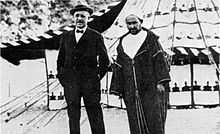Horacio Echevarrieta

Horacio Echevarrieta Maruri (Basque)(September 15, 1870 – May 20, 1963) was a businessman, banker, industrialist, patron of the arts, politician and diplomatic mediator. In 1927, he founded Iberia Líneas Aéreas de España, S. A. Operadora, now known as Iberia.
Born in Bilbao, the son of a mine owner, Cosme Echevarrieta,[1] he expanded his father's activities and set up businesses in many fields, such as the merchant marine, shipbuilding and real estate. He was one of the shareholders of The Niágara Spanish Aerocar Co., Limited which inaugurated the Spanish Aerocar at Niagara Falls, Ontario in 1916.[2]
A diputado for the Radical Republicano from 1914 to 1917,[3] in 1916 he bought the liberal paper El Liberal.[4]
After being placed under house arrest for his involvement in the 1917 general strike, he stepped down from his post of president of the Chamber of Commerce, gave up his seat in parliament, which was taken over by his political and business ally, Indalecio Prieto,[5] as well as from the leadership of the republicanism that he had inherited from his father.[6]

Following Spain's catastrophic defeat at the Battle of Annual in 1921, when 10,000–12,000 Spanish troops died, he acted as a mediator between the Spanish government and Abd el-Krim[3] in freeing the 300 Spanish soldiers captured,[7] for which, as a republican, he is said to have turned down King Alfonso XIII's offer of a title.[1]
At his Malaga estate, he played host to visitors like King Alfonso XIII, General Miguel Primo de Rivera and the German naval officer and spymaster Wilhelm Canaris, head of the Abwehr, the German military intelligence service (from 1935 to 1944).[8][9]
Echevarrieta y Larrinaga shipyard
He had extensive dealings with Canaris and in 1925 signed a lucrative contract to supply the German Reichsmarine with German-designed torpedoes[10] and had also built a U-Boat for testing and training.[11]
The German–designed prototype of the Type IA submarine, which was built under the designation of submarino E-1. However, the Spanish Navy lost interest in the project and it was finally sold to Turkey, which designated it as Gür.
Following the catastrophic Cádiz Explosion on 18 August 1947, which also completely destroyed Echevarrieta's adjoining shipyard,[12] the company, the largest single employer in the city, employing 2,500 workers, was basically without work until it was nationalised in 1952, although it wouldn't be until 1956 that steady work would again be available there.[13]
References
- ↑ 1.0 1.1 Glas, Eduardo Jorge (1997) Bilbao's Modern Business Elite, p.151. University of Nevada Press At Google Books. Retrieved 5 August 2013.
- ↑ (Spanish) "El 10 de febrero de 1916 se inaugura el funicular en las cataratas de Niágara, construido con capital vizcaino" Retrieved 6 August 2013.
- ↑ 3.0 3.1 (Spanish) "Un gran magnate" El País. Retrieved 5 August 2013.
- ↑ (Spanish) Estornés Zubizarreta, Idoia "Partido Republicano Federal" Retrieved 5 August 2013.
- ↑ Townson, Nigel (2000) The Crisis of Democracy in Spain: Centrist Politics Under the Second Republic, 1931-1936, p. 324. Sussex Academic Press At Google Books. Retrieved 5 August 2013.
- ↑ Cabrera, Mercedes and Fernando del Rey Reguillo (2007) The Power of Entrepreneurs: Politics and Economy in Contemporary Spain, p. 4. Berghahn Books At Google Books. Retrieved 5 August 2013.
- ↑ (Spanish) "Ciudadano Echevarrieta" Deia. Retrieved 5 August 2013.
- ↑ (Spanish) "'El último magnate' rescata la figura de Horacio Echevarrieta"
- ↑ Bassett, Richard (2011) Hitler's Spy Chief. Hachette UK At Google Books. Retrieved 5 August 2013.
- ↑ Trials of war criminals before the Nuremberg Military Tribunals under Control Council law no. 10, Nuernberg, October 1946-April 1949, Volume 10, p. 461. U. S. Govt. Print. Off. 1951 At Google Books. Retrieved 5 August 2013.
- ↑ Mueller, Michael (2007) Canaris: The Life and Death of Hitler's Spymaster, pp. 64–69. Naval Institute Press At Google Books. Retrieved 5 August 2013.
- ↑ (Spanish) Echevarrieta shipyards Retrieved 4 August 2013.
- ↑ (Spanish) Pérez de Guzmán Padrón, Sofía (2011) “La representación social de una actividad productiva como contexto y apoyo de la acción sindical. Los astilleros gaditanos en las coplas del carnaval” in Cuadernos de Relaciones Laborales, Vol. 29, Núm. 1 (2011) 201-225 Retrieved 4 August 2013.